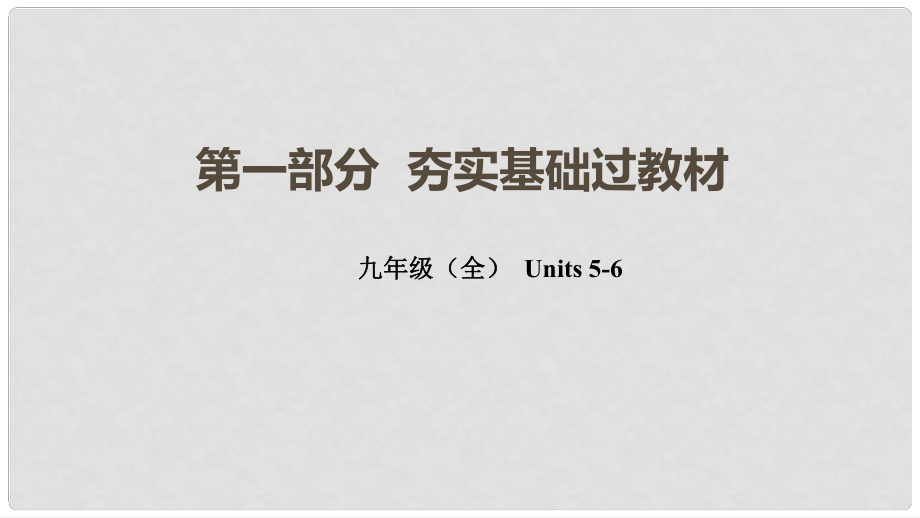《云南省中考英語(yǔ)總復(fù)習(xí) 第一部分 夯實(shí)基礎(chǔ)過(guò)教材 九全 Units 56課件 人教新目標(biāo)版》由會(huì)員分享�,可在線閱讀,更多相關(guān)《云南省中考英語(yǔ)總復(fù)習(xí) 第一部分 夯實(shí)基礎(chǔ)過(guò)教材 九全 Units 56課件 人教新目標(biāo)版(13頁(yè)珍藏版)》請(qǐng)?jiān)谘b配圖網(wǎng)上搜索�。
1、第一部分 夯實(shí)基礎(chǔ)過(guò)教材九九年級(jí)(年級(jí)(全全) Units 5-6For example, Anxi and Hangzhou are widely known for their tea.例如�,安溪和杭州以它們的茶例如,安溪和杭州以它們的茶而遠(yuǎn)近聞名�。而遠(yuǎn)近聞名。(Unit 5 P34)考考 點(diǎn)點(diǎn) 1【考點(diǎn)精講考點(diǎn)精講】辨析辨析be known for, be known as與與be known to( (省省卷:卷:2013.75)2013.75)詞組詞組含義及用法含義及用法be known for( (省卷:省卷:2013.75)2013.75)意為意為“因因而出名而出名”�,其后常接表
2�、示某人或某物的�,其后常接表示某人或某物的特長(zhǎng)、特點(diǎn)的詞�。特長(zhǎng)、特點(diǎn)的詞�。be known as意為意為“作為作為而出名而出名”,as后接表示某個(gè)人的職業(yè)�、后接表示某個(gè)人的職業(yè)、身份或地位的名詞�。身份或地位的名詞。be known to意為意為“對(duì)對(duì)而言是著名的而言是著名的”�,其后常接一個(gè)群體。�,其后常接一個(gè)群體。溫馨提示:溫馨提示:以上三個(gè)短語(yǔ)中的以上三個(gè)短語(yǔ)中的known可替換為可替換為famous或或wellknown�,含義相同。�,含義相同?!究键c(diǎn)沖關(guān)考點(diǎn)沖關(guān)】1. Pyramids in Egypt _ people all over the world. Many people wou
3、ld like to visit it.(對(duì)對(duì)而言是著名的而言是著名的)2. Confucius is _ a great thinker in ancient China.(作為作為而著名而著名)is known toknown as3. I want to visit a place that _ its scenery. (因因而著名而著名)is known for4. Chaplin is _ us all, as he developed a new manner of acting.A. known as B. known to C. known for D. known onBS
4�、ome leaves from a tea plant fell into the water and remained there for some time.一棵茶樹(shù)上的幾片葉一棵茶樹(shù)上的幾片葉子落在了水中并在水中停留了一會(huì)兒。子落在了水中并在水中停留了一會(huì)兒�。(Unit 6 P43)【考點(diǎn)精講考點(diǎn)精講】remain的用法的用法考考 點(diǎn)點(diǎn) 2 remain意為意為“保持不變;剩余保持不變;剩余”�。remain作動(dòng)詞時(shí)�,后面作動(dòng)詞時(shí),后面接形容詞�、名詞、現(xiàn)在分詞�、過(guò)去分詞或介詞短語(yǔ)。如接形容詞�、名詞、現(xiàn)在分詞�、過(guò)去分詞或介詞短語(yǔ)。如:I didnt remain long in the ci
5�、ty. 我沒(méi)在那個(gè)城市逗留很長(zhǎng)時(shí)間我沒(méi)在那個(gè)城市逗留很長(zhǎng)時(shí)間?!究键c(diǎn)沖關(guān)考點(diǎn)沖關(guān)】5. In any emergency, you should always remain _. A. calm B. calmed C. to calm D. calmingA6. Kate remained _ where she was for some time, after her good friend left. A. stand B. stood C. standing D. to standCEven though many people now know about tea culture,
6、the Chinese are without doubt the ones who best understand the nature of tea.盡管現(xiàn)在很盡管現(xiàn)在很多人都了解茶文化�,但毫無(wú)疑問(wèn)中國(guó)人是最了解多人都了解茶文化,但毫無(wú)疑問(wèn)中國(guó)人是最了解茶性的�。茶性的。(Unit 6 P43)考考 點(diǎn)點(diǎn) 3【考點(diǎn)精講】doubt的用法如:如:A sudden doubt came into my mind. 我我心中突然心中突然起了起了 疑慮疑慮�。 Without doubt, this is the best choice. 毋庸置疑毋庸置疑,這是這是 最好的最好的選擇�。選擇。 I do
7�、ubt if/whether he will come. 我懷疑他是否會(huì)來(lái)。我懷疑他是否會(huì)來(lái)。 Do you doubt that he will not win? 你懷疑他不會(huì)贏嗎�?你懷疑他不會(huì)贏嗎?【考點(diǎn)沖關(guān)考點(diǎn)沖關(guān)】7. _�, John is the suitable person to attend the meeting(毋庸置疑毋庸置疑)There is _ that he will win the election.(毫無(wú)疑問(wèn)毫無(wú)疑問(wèn))Without doubt8. There are so many dishes on the menu. I am _ what to eat.
8、(拿不定主意拿不定主意)in doubtno doubt9. I dont doubt _ he can finish the task on time. A. what B. that C. if D. whetherB10. I doubt _ he will win the first prize after he hurt his left arm. A. whom B. if C. why D. thatB11. There is no doubt _ drinking more water is good for our health. A. whether B. why C. that D. ifC
 云南省中考英語(yǔ)總復(fù)習(xí) 第一部分 夯實(shí)基礎(chǔ)過(guò)教材 九全 Units 56課件 人教新目標(biāo)版
云南省中考英語(yǔ)總復(fù)習(xí) 第一部分 夯實(shí)基礎(chǔ)過(guò)教材 九全 Units 56課件 人教新目標(biāo)版

